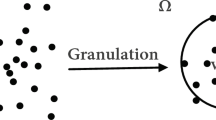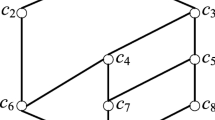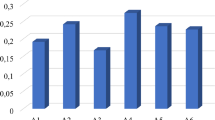Abstract
Formal concept analysis (FCA) is an important analytical tool for cognitive science. The generalized one-sided concept lattice extends the classical concept lattice, which considers the order between the attributes values. The structure of generalized one-sided concept lattice is more complicated than the classical concept lattice. The complexity of constructing generalized one-sided concept lattice is added when the original formal context extends to a multi-granularity formal context. To address this problem, this paper proposes Zoom algorithms based on the granularity trees and the existing generalized one-sided concept lattices. Firstly, the Zoom-in algorithm is designed to construct the generalized one-sided concept lattice when changing the granularity of the attribute value from coarse-granularity to fine-granularity. Then, Zoom-out algorithm is explored to produce the generalized one-sided concept lattice when changing the granularity of the attribute value from fine-granularity to coarse-granularity. Finally, experimental results explain the effectiveness of our algorithms.

























Similar content being viewed by others
Data availability
The data that support the findings of this study are available from the corresponding author upon reasonable request.
References
Ganter B, Wille R (1999) Formal concept analysis: mathematical foundations. Springer, Berlin
Xu W, Guo D, Mi J, Qian Y, Zheng K, Ding W (2023) Two-way concept-cognitive learning via concept movement viewpoint. IEEE Trans Neural Netw Learn Syst 34(10):6798–6812. https://doi.org/10.1109/TNNLS.2023.3235800
Houari A, Yahia SB (2024) A top-k formal concepts-based algorithm for mining positive and negative correlation biclusters of dna microarray data. Int J Mach Learn Cybern 15:941–962. https://doi.org/10.1007/s13042-023-01949-9
Guo D, Xu W (2023) Fuzzy-based concept-cognitive learning: an investigation of novel approach to tumor diagnosis analysis. Inf Sci 639:118998. https://doi.org/10.1016/J.INS.2023.118998
Yuan K, Xu W, Li W, Ding W (2022) An incremental learning mechanism for object classification based on progressive fuzzy three-way concept. Inf Sci 584:127–147
Shao M, Hu Z, Wu W, Liu H (2023) Graph neural networks induced by concept lattices for classification. Int J Approx Reason 154:262–276. https://doi.org/10.1016/J.IJAR.2023.01.001
Bogdanovic M, Gligorijevic MF, Veljkovic NZ, Puflovic D, Stoimenov L (2023) Cross-portal metadata alignment - connecting open data portals through means of formal concept analysis. Inf Sci 637:118958. https://doi.org/10.1016/J.INS.2023.118958
Poshyvanyk D, Gethers M, Marcus A (2013) Concept location using formal concept analysis and information retrieval. ACM Trans Softw Eng Methodol 21(4):1–34. https://doi.org/10.1145/2377656.2377660
Guo D, Xu W, Qian Y, Ding W (2024) Fuzzy-granular concept-cognitive learning via three-way decision: Performance evaluation on dynamic knowledge discovery. IEEE Trans Fuzzy Syst 32(3):1409–1423. https://doi.org/10.1109/TFUZZ.2023.3325952
Belohlávek R, Vychodil V (2012) Formal concept analysis and linguistic hedges. Int J Gen Syst 41(5):503–532. https://doi.org/10.1080/03081079.2012.685936
Wu X, Wang J, Shi L, Gao Y, Liu Y (2019) A fuzzy formal concept analysis-based approach to uncovering spatial hierarchies among vague places extracted from user-generated data. Int J Geogr Inf Sci 33(5):991–1016. https://doi.org/10.1080/13658816.2019.1566550
Medina J (2012) Multi-adjoint property-oriented and object-oriented concept lattices. Inf Sci 190:95–106. https://doi.org/10.1016/J.INS.2011.11.016
Zhi H, Li Y (2023) Attribute granulation in fuzzy formal contexts based on L-fuzzy concepts. Int J Approx Reason 159:108947. https://doi.org/10.1016/J.IJAR.2023.108947
Pócs J (2012) On possible generalization of fuzzy concept lattices using dually isomorphic retracts. Inf Sci 210:89–98. https://doi.org/10.1016/J.INS.2012.05.004
Antoni L, Krajci S, Kridlo O (2018) On stability of fuzzy formal concepts over randomized one-sided formal context. Fuzzy Sets Syst 333:36–53. https://doi.org/10.1016/J.FSS.2017.04.006
Hu Z, Shao M, Liu H, Mi J (2022) Cognitive computing and rule extraction in generalized one-sided formal contexts. Cogn Comput 14:2087–2107. https://doi.org/10.1007/S12559-021-09868-Z
Jaoua A, Elloumi S (2002) Galois connection, formal concepts and galois lattice in real relations: application in a real classifier. J Syst Softw 60(2):149–163. https://doi.org/10.1016/S0164-1212(01)00087-5
Butka P, Pócs J (2013) Generalization of one-sided concept lattices. Comput Inform 32(2):355–370
Butka P, Pócs J, Pócsová J (2014) Basic theorem for generalized one-sided concept lattices. Appl Math Sci 8:463–468
Butka P, Pócs J, Pócsova J (2014) On equivalence of conceptual scaling and generalized one-sided concept lattices. Inf Sci 259:57–70. https://doi.org/10.1016/J.INS.2013.08.047
Obiedkov S. A (2012). Modeling preferences over attribute sets in formal concept analysis. In: Formal concept analysis - 10th international conference, ICFCA 2012, Leuven, Belgium, May 7-10, 2012. Proceedings, Springer, 227–243. https://doi.org/10.1007/978-3-642-29892-9_22
Halas R, Pócs J (2015) Generalized one-sided concept lattices with attribute preferences. Inf Sci 303:50–60. https://doi.org/10.1016/J.INS.2015.01.009
Shao M, Li K (2015). A new type of generalized one-sided concept lattices and its knowledge reduction. In: 2015 international conference on machine learning and cybernetics, ICMLC 2015, Guangzhou, China, July 12-15, 2015, IEEE, 265–270. https://doi.org/10.1109/ICMLC.2015.7340933
Smatana M, Butka P(2016) .Dynamic visualization of generalized one-sided concept lattices and their reductions. In: Information systems architecture and technology: proceedings of 37th international conference on information systems architecture and technology - ISAT 2016 - Part I, Karpacz, Poland, September 18-20, 2016, Springer, 55–66. https://doi.org/10.1007/978-3-319-46583-8_5
Zadeh LA (2008) Toward human level machine intelligence - is it achievable? the need for a paradigm shift. IEEE Comput Intell Mag 3(3):11–22. https://doi.org/10.1109/MCI.2008.926583
Yao W, Han S (2023) A topological approach to rough sets from a granular computing perspective. Inf Sci 627:238–250. https://doi.org/10.1016/J.INS.2023.02.020
Yang J, Wang G, Zhang Q, Chen Y, Xu T (2019) Optimal granularity selection based on cost-sensitive sequential three-way decisions with rough fuzzy sets. Knowl-Based Syst 163:131–144. https://doi.org/10.1016/J.KNOSYS.2018.08.019
Wan Q, Li J, Wei L (2022) Optimal granule combination selection based on multi-granularity triadic concept analysis. Cogn Comput 14(6):1844–1858. https://doi.org/10.1007/S12559-021-09934-6
Gao Y, Chen D, Wang H (2024) Optimal granularity selection based on algorithm stability with application to attribute reduction in rough set theory. Inf Sci 654:119845. https://doi.org/10.1016/j.ins.2023.119845
Zhang X, Huang Y (2023) Optimal scale selection and knowledge discovery in generalized multi-scale decision tables. Int J Approx Reason 161:108983. https://doi.org/10.1016/J.IJAR.2023.108983
Jiang Z, Yang X, Yu H, Liu D, Wang P, Qian Y (2019) Accelerator for multi-granularity attribute reduction. Knowl-Based Syst 177:145–158. https://doi.org/10.1016/J.KNOSYS.2019.04.014
Hu Z, Shao M, Wu W, Li L (2023) Knowledge acquisition of multi-granularity ordered information systems. Appl Soft Comput 146:110674. https://doi.org/10.1016/J.ASOC.2023.110674
Zou L, Ren S, Sun Y, Yang X (2023) Attribute reduction algorithm of neighborhood rough set based on supervised granulation and its application. Soft Comput 27(3):1565–1582. https://doi.org/10.1007/S00500-022-07454-5
Zhang Q, **ng Y, Wang G (2010) The mutual transformation of conceptual knowledge particles and conceptual information particles. J Shandong Univ (Science Edit) 45(9):1–6. https://doi.org/10.1007/S00500-022-07454-5
Wang Z, Qi J, Shi C, Ren R, Wei L (2023) Multiview granular data analytics based on three-way concept analysis. Appl Intell 53(11):14645–14667. https://doi.org/10.1007/S10489-022-04145-4
**e J, Zhang L, Yang J (2023) A fast algorithm for updating negative concept lattices with increasing the granularity sizes of attributes. Mathematics 11(14):3229. https://doi.org/10.3390/math11143229
Belohlávek R, Sklenar V (2005). Formal concept analysis over attributes with levels of granularity. In: International conference on computational intelligence for modelling, control and automation and international conference on intelligent agents, web technologies and internet commerce (CIMCA-IAWTIC’06), IEEE, 619–624. https://doi.org/10.1109/CIMCA.2005.1631332
Belohlávek R, Baets BD, Konecny J (2014) Granularity of attributes in formal concept analysis. Inf Sci 260:149–170. https://doi.org/10.1016/J.INS.2013.10.021
Kang X, Miao D (2016) A study on information granularity in formal concept analysis based on concept-bases. Knowl-Based Syst 105:147–159. https://doi.org/10.1016/J.KNOSYS.2016.05.005
Zou L, Zhang Z, Long J (2016) An efficient algorithm for increasing the granularity levels of attributes in formal concept analysis. Expert Syst Appl 46:224–235. https://doi.org/10.1016/J.ESWA.2015.10.026
Li F, Hu B (2017) A new approach of optimal scale selection to multi-scale decision tables. Inf Sci 381:193–208. https://doi.org/10.1016/J.INS.2016.11.016
Author information
Authors and Affiliations
Corresponding author
Additional information
Publisher's Note
Springer Nature remains neutral with regard to jurisdictional claims in published maps and institutional affiliations.
Rights and permissions
Springer Nature or its licensor (e.g. a society or other partner) holds exclusive rights to this article under a publishing agreement with the author(s) or other rightsholder(s); author self-archiving of the accepted manuscript version of this article is solely governed by the terms of such publishing agreement and applicable law.
About this article
Cite this article
Shao, Z., Hu, Z., Lv, M. et al. The construction of multi-granularity generalized one-sided concept lattices. Int. J. Mach. Learn. & Cyber. (2024). https://doi.org/10.1007/s13042-024-02208-1
Received:
Accepted:
Published:
DOI: https://doi.org/10.1007/s13042-024-02208-1




